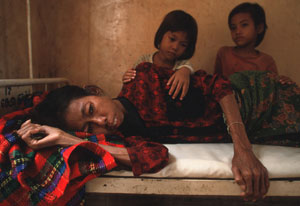Fogarty awards $17 million in new HIV research training grants
September 3, 2014

Photo courtesy of World Bank/ Masaru Goto
New awards from Fogarty's HIV Research Training
Program will help address the evolving HIV/AIDS
epidemic in Cambodia and nine other developing
countries.
As the HIV/AIDS epidemic evolves in developing nations, new research questions are emerging. To help address these, Fogarty recently announced it plans to award about $16.5 million over five years in 11 grants to strengthen research training in 10 low- and middle-income countries (LMICs) and increase their institutions' ability to compete for independent research funding. In addition, Fogarty will issue four planning grants to provide up to $242,000 over two years, as well as a one-year award of about $288,000.
Awardees under Fogarty's HIV Research Training Program are encouraged to focus on building or strengthening HIV-related capacity in a particular scientific area. The projects funded by the new awards encompass a wide range of topics, including HIV-TB coinfections, implementation science, data management and analysis, transmission prevention, epidemiology and HIV counseling and testing.
"These new HIV awards will enable Fogarty investigators at LMIC institutions to design research training platforms addressing long-standing unanswered questions, as well as new concerns that have arisen as a result of recent scientific advances," said Fogarty Director Dr. Roger I. Glass. "This approach will allow grantees to be more responsive to emerging needs and will encourage collaborations with NIH and other U.S.-supported initiatives working to improve global health."
The effects of alcohol on HIV risk, as well as HIV cardiovascular and metabolic complications, will be the focus of a new program being launched in Botswana by the University of Pennsylvania. The University of California, Los Angeles will use its award to develop short courses for trainees in Thailand, focusing on modeling for disease burden, mobile phone and internet technologies for data collection, and evidence-based behavioral interventions.
Two of the new projects focus on HIV-related cancer research. In Nigeria, Northwestern University will develop innovative collaborative research related to Kaposi sarcoma and non-Hodgkin lymphoma. Meanwhile, the Fred Hutchinson Cancer Research Center will expand research training related to HIV-associated malignancies in Uganda.
Additional awards will focus on such issues as diagnosis of tuberculosis, health economics and health systems, translational basic research, bioinformatics and antiretroviral therapy.
Over the last decade, efforts to implement research findings within the context of increased provision of HIV prevention, care and treatment in LMICs have led to the emergence of new research issues, such as combination HIV prevention interventions, better linking of newly diagnosed individuals into care programs and integration of HIV programs with other health services. There is a growing need for evidence-based solutions to these and other, as yet undefined, research issues.
The awards are partly funded by NIH partners, the National Institute on Drug Abuse (NIDA), National Institute of Mental Health (NIMH) and National Cancer Institute (NCI). The overall goal of the Fogarty HIV Research Training Program is to strengthen the human capacity to contribute to the ability of institutions in LMICs to conduct HIV-related research on the evolving HIV-related epidemics in their country and to compete independently for research funding. Each award focuses on one LMIC institution's efforts to deepen research capacity in a particular area of science. The program consolidates two long-standing Fogarty programs, the AIDS International Training and Research Program (AITRP) and the International Implementation, Clinical, Operational and Health Services Research Training Award for AIDS TB (IICOHRTA-AIDS/TB) program.
Some of the most important scientific advances in HIV/AIDS - including interventions to reduce mother-to-child HIV transmission, to address HIV/TB co-infection, and to prevent HIV infection through behavior change, microbicides and antiretroviral drugs - have been facilitated through partnerships with LMIC scientists and supported by Fogarty research training programs.
2014 full awards for Fogarty HIV Research Training Program
2014 planning grants for Fogarty HIV Research Training Program
2014 one-year awards for Fogarty HIV Research Training Program
More Information
To view Adobe PDF files,
download current, free accessible plug-ins from Adobe's website.